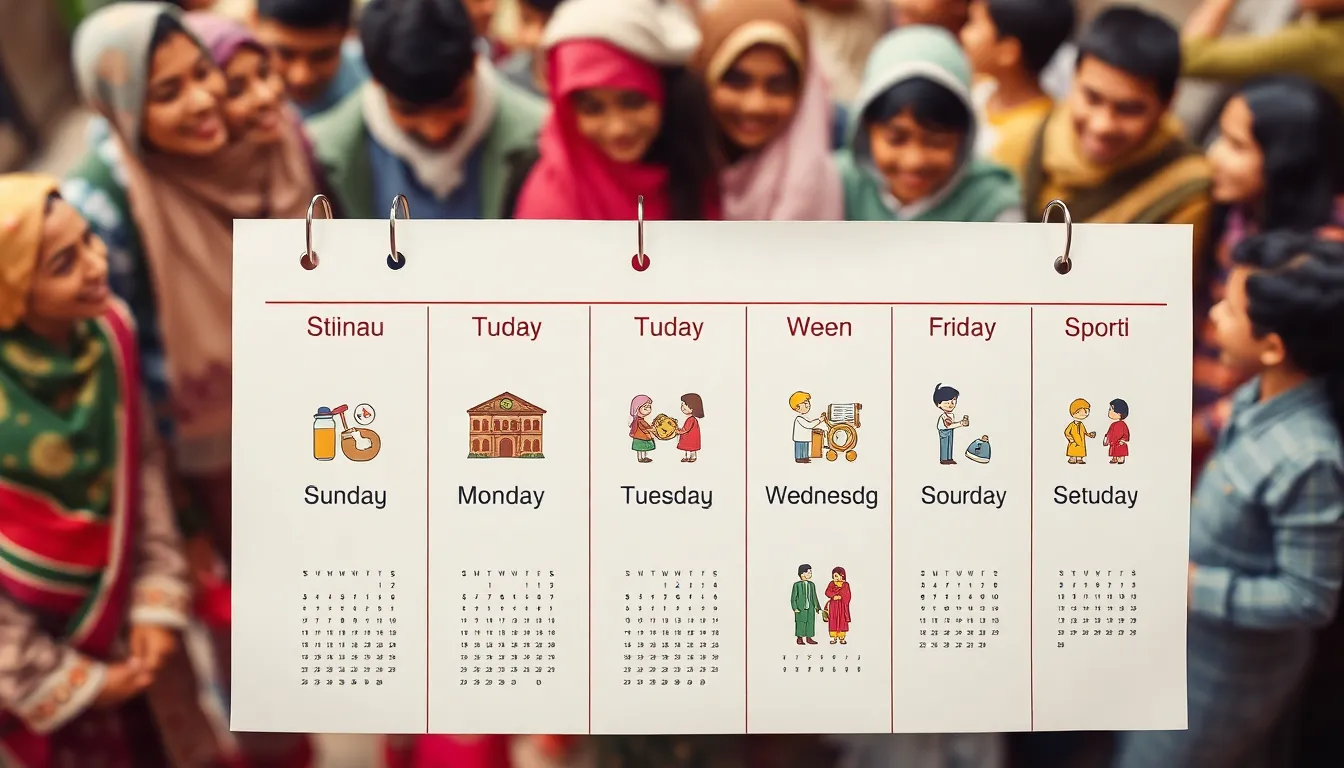When it comes to time, some people have it down to a science, while others might still be figuring out how many days are in two weeks. Spoiler alert: it’s not rocket science, but it can feel like it when you’re knee-deep in a busy schedule. Understanding simple timeframes is crucial for planning vacations, deadlines, or even just counting down to the weekend.
Table of Contents
ToggleUnderstanding Time Measurements
Time measurements play a crucial role in daily life. One week equals seven days, making two weeks a total of fourteen days. People often use weeks to plan events and manage tasks effectively.
Days serve as a basic piece in the larger puzzle of time management. Recognizing the connection between days, weeks, and months aids individuals in scheduling and prioritizing activities.
For example, a week comprises multiple periods, including weekdays and weekends. Individuals often mark weekends for leisure and weekdays for work. This classification helps manage time better.
Calendars typically break down months into four weeks. Each month varies in the number of days, but understanding the weekly format simplifies planning. Two weeks comprise a significant portion of the month, influencing deadlines and appointments.
Clarity in time measurements supports more effective decision-making. Grasping how many days are in weeks aids in estimating durations for projects or holidays. Comparative knowledge can enhance efficiency in both personal and professional contexts.
Overall, recognizing the fundamental aspects of time measurements can significantly streamline planning efforts. Clear understanding lays the foundation for informed decisions, whether for short-term meetings or long-term goals.
Days in a Week


Understanding the concept of days in a week forms the foundation for effective time management. A standard week comprises seven days, specifically Sunday, Monday, Tuesday, Wednesday, Thursday, Friday, and Saturday.
Standard Calendar
Most societies adhere to the Gregorian calendar, which includes seven days in each week. Each day has specific cultural and practical significance. For instance, Monday often signifies the beginning of the workweek, while Saturday and Sunday are commonly recognized as the weekend. Recognizing this structure aids in various planning scenarios, including scheduling meetings or setting deadlines, and highlights the importance of time classification when managing tasks.
Variations Across Cultures
Cultural differences vary widely in how weeks are perceived. Some cultures designate specific days for rest or religious observance, altering their work schedules. For example, in many Arab countries, the workweek shifts, with Friday being a key day for prayers. Other cultures may prioritize specific days for family or community activities. These variations can impact how individuals approach tasks and responsibilities. Understanding these differences fosters better communication and collaboration in a global context.
Calculating Two Weeks
Two weeks equal fourteen days. Understanding this basic time measurement aids in effective planning.
Basic Arithmetic
One week contains seven days, so multiplying seven by two results in fourteen. This foundational arithmetic reinforces the simplicity of calculating timeframes. People often overlook that two weeks amount to a full fortnight, which is a term noted in some cultures. Various calendars detail this calculation straightforwardly, making it accessible and easy to remember. Recognizing these values allows individuals to compute time intervals quickly, whether for personal events or project timelines.
Real-World Applications
Two weeks comes into play in numerous real-world scenarios. Planning a vacation typically involves considering this timeframe for bookings and itineraries. Countdown periods for events often span two weeks, such as project deadlines and preparation times. In workplaces, schedules frequently revolve around bi-weekly cycles for paychecks, meetings, or reporting. Knowing that two weeks equal fourteen days assists in grasping the duration of these activities, ensuring efficient time management in both personal and professional contexts.
Importance of Time Calculation
Understanding time calculation plays a crucial role in many aspects of life. Accurate time management enhances efficiency and productivity, leading to better decision-making and planning.
Scheduling and Planning
Efficient scheduling hinges on recognizing the significance of two weeks. A timeframe of fourteen days allows individuals to organize tasks and set deadlines effectively. For events and commitments, precision matters; planning two weeks ahead often ensures necessary preparations. Project timelines often incorporate bi-weekly intervals. Utilizing this timeframe helps in coordinating calendars, avoiding conflicts, and making informed choices. By understanding the concept of two weeks, people can optimize workflows and remain on target with goals.
Cultural Significance
Cultural perspectives shape how weeks are viewed across different societies. Some cultures assign specific meanings to certain days, influencing workweek structures and leisure. For instance, some nations celebrate weekends prominently while others may integrate religious observances. Acknowledging these variations enables collaboration across diverse teams. The idea of a fortnight, equivalent to fourteen days, may resonate differently across cultures, affecting how planning occurs. Understanding cultural differences fosters respectful communication and enhances teamwork, crucial in today’s globalized environment.


